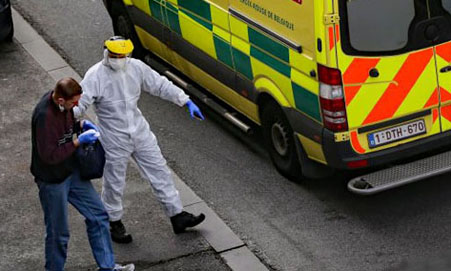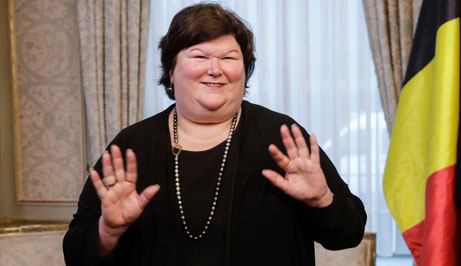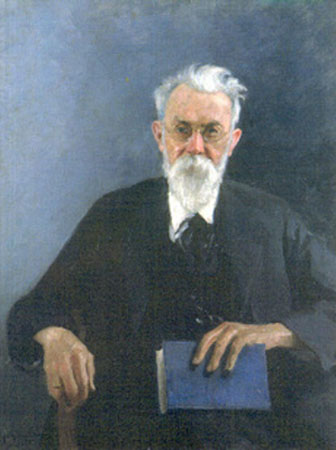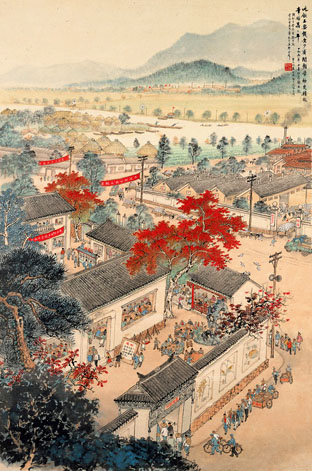The situation brought about by the COVID-19 crisis might be the biggest symbol of our entry in the 21st century in a time when capitalism is going on a rampage against biology and our nature itself. Today, everything has to be consumable, even wild animals on which global smuggling yields enormous amounts of money in spite of its illegality.
Whereas the first case of COVID-19 appeared in Belgium at the beginning of February – a man coming back from Wuhan – and the fact that all the population is confined since March, 18th, what can be said about our country’s situation today?

Belgium has just passed the 2500 symbolic mark of death (2523 today) caused by the COVID-19. On April 8th, 5590 hospital beds were used for patients suffering of COVID-19, of which 1285 in intensive care, while 24.983 confirmed cases were reported.
Despite this dramatic account, doctors, nurses, care assistants or pharmacists (not to mention the “second line” workers within the medical structures) are time and again facing a lack of protective material ; some of them having been infected.
The health care personnel and all the other workers being in contact with the public do not have anything to protect themselves: too lest screening tests, safety masks, sanitizing gel, protective gowns, gloves; some medicines are even running down, such as for example, the “curare”, which is used in anesthesia to bring about a necessary muscular relaxation when it comes to intubate the patients.
This recurring lack of medical means has forced a nursing home’s management in Brussels’ suburbs to call upon the army to provide help for the operation of its services. Despite its numerous call for help to be given some screening tests and protection material – calls gone cold since weeks – some COVID-19 cases appeared amongst the residents even if the home was functioning in isolation since March, 18th.
As a result, only six or seven caregivers could work yesterday on the fifty or so members of the team: most of them being either infected, fearing of being infected and infect the residents.

Even if we are aware that other European countries such as France, Italy and Spain are facing the same situation, this reality is worsened in Belgium because of the desire for separation formulated by the NV-A and Vlaams Belgang’ fascists.
Thus, after trying to appropriate a biggest amount of safety masks than they were supposed to receive, some NV-A ministers forced our country to abstain concerning the European decision of giving 37 billion euros to fight the epidemic because Wallonia would have “benefited” more than Flanders, according to these fascists.
Through this chaotic management of the COVID-19 crisis, we are witnessing that the sinking of Belgian’s liberalism is fully burned off. Any Communist knows that our present minority bourgeois government with its special powers is not able, because of its liberal-libertarian ideology and its ultra-individualism, to think in terms of stabilization with an attitude proper to a State apparatus presenting itself as a bureaucratic monster above the people sticking to the perpetuation of a society dedicated to capitalism.
In this bureaucratic monster, the Federal Health minister Maggie De Block is only one of the most horrible avatar. The hatred against her is such today that the people working in hospitals, nursing homes, accommodation homes for disabled people are gathering on social networks to fill a class action against this minister whose incompetence is only matched with her mediocrity and her cynism.

Yet, as recently shown by an important document of the Parti Communiste de France (mlm), the COVID-19 is a direct product of capitalism: of its mode of production, its sprawling cities, its industrial and artisanal consumption of animals, its individualist manners, its relationship to the body. The text insists on the fact that it constitutes a quality leap showing that our time is a time of breakage, of unhooking, of total transformation because capitalism has done its time.
But as we know that it all began in China, we have to say that if hundreds and hundreds of thousand wild animals were not captured there in the most sleazy conditions to be brought and killed on the market, to be consumed as food, the COVID-19 crisis would not have existed.
But whatever we think of China, of its “socialism” which has become a full capitalism to become a superpower rival of the United States, of the fascination of its elites for its urban inrush, there remains in the Chinese society an enormous sense of collective commitment and of collective responsibility. The containment of Hubei could thus be massively and very quickly implemented, just as all the sanitary instructions all around the country.
In the face of all this, we have to show the way to go beyond the contradiction between cities and countryside; humanity has to back off and understand its place into the biosphere. Yes, cities must back off, they must loosen their grip on the world so that human beings can live properly, just as the animals they are. It is a question of civilization: what civilization do we want?
One of concrete world where human beings are slaves of the capital always seeking to reproduce themselves over and over, to widen while swallowing the entire planet and considering our Earth as a big stone?
Or should our program be Communism, namely a civilization without classes nor State, in which humanity lives on our Earth fully understanding that it is a biosphere?

Stalin’s USSR and Mao Zedong’s China had perfectly understand this issue. The thesis on biosphere, explained by Vernadsky, were assumed by Stalin’s USSR which also moved towards the settlement of the contradiction between the cities and the countryside. It is impossible to understand USSR’s socialization of the countryside, the generalization of the Kolkhozes and Sovkhoze without correctly understanding this purpose: the creation of semi-urban semi-rural centers with very high cultural level.
In the same way, it is also impossible to understand the Chinese popular communes without seeing that their identity was the exact opposite of what Deng Xiaoping carried out later: a totally unbridled, unbalanced, massively exploiting and polluting development. The popular communes were aiming to a balanced development with a mindful refusal of any pollution; they were seeking to progress towards the resolution of the contradiction between cities and the countryside, with caution, and being aware of this communist goal.
How was the understanding of this contradiction theoretically born?
It was Karl Marx and Friedrich Engels’ work. The two founders of Marxism understood the nature of human beings, they perfectly knew that the human being is an animal. Therefore, they considered cities, such as they exist in capitalism, as necessarily transient in humanity’s history. Here is how this understanding was established, with two quotes from Friedrich Engels’ work: one on the cities and the other on the unavoidable and key relationship between humans and nature.
Let’s first see how Friedrich Engels perfectly understood the lack of moral required by the capitalist’s relationships in big cities, in an incredibly deep manner:
« The very turmoil of the streets has something repulsive, something against which human nature rebels.
The hundreds of thousands of all classes and ranks crowding past each other, are they not all human beings with the same qualities and powers, and with the same interest in being happy? And have they not, in the end, to seek happiness in the same way, by the same means?
And still they crowd by one another as though they had nothing in common, nothing to do with one another, and their only agreement is the tacit one, that each keep to his own side of the pavement, so as not to delay the opposing streams of the crowd, while it occurs to no man to honour another with so much as a glance.
The brutal indifference, the unfeeling isolation of each in his private interest, becomes the more repellent and offensive, the more these individuals are crowded together, within a limited space.
And, however much one may be aware that this isolation of the individual, this narrow self-seeking, is the fundamental principle of our society everywhere, it is nowhere so shamelessly barefaced, so self-conscious as just here in the crowding of the great city. The dissolution of mankind into monads, of which each one has a separate principle, the world of atoms, is here carried out to its utmost extreme.
Hence it comes, too, that the social war, the war of each against all, is here openly declared. Just as in Stirner’s recent book [The Ego and Its Own], people regard each other only as useful objects; each exploits the other, and the end of it all is that the stronger treads the weaker under foot; and that the powerful few, the capitalists, seize everything for themselves, while to the weak many, the poor, scarcely a bare existence remains. »(The Condition of the Working Class in England)
These sentences date back to the middle of the 19th century, but Friedrich Engels has perfectly understood the underlying trend, the anonymous and inhuman nature of the towns and the fact that they are built by the bourgeoisie so as to fulfil its needs.
But if Friedrich Engels understood that, if he claimed that these towns are not suitable for human beings, it is because he understood what is a human being, and its need to be one with nature:
« In short, the animal merely uses its environment, and brings about changes in it simply by its presence; man by his changes makes it serve his ends, masters it. This is the final, essential distinction between man and other animals, and once again it is labour that brings about this distinction.
Let us not, however, flatter ourselves overmuch on account of our human victories over nature. For each such victory nature takes its revenge on us. Each victory, it is true, in the first place brings about the results we expected, but in the second and third places it has quite different, unforeseen effects which only too often cancel the first. The people who, in Mesopotamia, Greece, Asia Minor and elsewhere, destroyed the forests to obtain cultivable land, never dreamed that by removing along with the forests the collecting centres and reservoirs of moisture they were laying the basis for the present forlorn state of those countries.
When the Italians of the Alps used up the pine forests on the southern slopes, so carefully cherished on the northern slopes, they had no inkling that by doing so they were cutting at the roots of the dairy industry in their region; they had still less inkling that they were thereby depriving their mountain springs of water for the greater part of the year, and making it possible for them to pour still more furious torrents on the plains during the rainy seasons.
Those who spread the potato in Europe were not aware that with these farinaceous tubers they were at the same time spreading scrofula. Thus at every step we are reminded that we by no means rule over nature like a conqueror over a foreign people, like someone standing outside nature – but that we, with flesh, blood and brain, belong to nature, and exist in its midst, and that all our mastery of it consists in the fact that we have the advantage over all other creatures of being able to learn its laws and apply them correctly.
And, in fact, with every day that passes we are acquiring a better understanding of these laws and getting to perceive both the more immediate and the more remote consequences of our interference with the traditional course of nature. In particular, after the mighty advances made by the natural sciences in the present century, we are more than ever in a position to realise, and hence to control, also the more remote natural consequences of at least our day-to-day production activities.
But the more this progresses the more will men not only feel but also know their oneness with nature, and the more impossible will become the senseless and unnatural idea of a contrast between mind and matter, man and nature, soul and body, such as arose after the decline of classical antiquity in Europe and obtained its highest elaboration in Christianity. » (The Part played by the Labour in the Transition from Ape to Man).
We Communists thus propose a perspective of harmony with our Earth considered as a biosphere where planning allows the humanity to exist without living of nature’s destruction and in which each individual may prosper in a natural life where its cultural level increases.
We need cities on a human scale, where predominate public transport, which do not conflict with wild life, allowing an important presence of greenery, systematically using solar and wind energies.

We propose a society where professional activities do not oppose to intellectual and manual activities, enabling to change job for certain periods of time, to partially extend studies all along one’s life.
This is why we do demand a planning which goes through the socialization of the means of production.
Only a democratic State, namely socialist, driven by its working class and not its bourgeoisie, can correctly decide its main orientations, providing for what is necessary to come to an economically balanced development, in harmony with nature, meeting cultural and basic needs while definitively breaking this barbarism consisting of wild or farm animals’ consumption.
It means two things: first, break with the private ownership of the means of production Then, break with all dominant ideologies from the hero worship to the insane entertainments given by our media and to individualism, nihilism, pessimism, relativism and existentialism.
To inward-looking attitudes, we oppose the need of Communism inherent to the necessary overtaking of the contradiction between towns and the countryside, between manual and intellectual work.
This need of Communism, which is general amongst the masses of the people, is driven by the working class, the most exploited class, at the heart of the capitalist production.
It is from this need of Communism and of its implementation that will dawn the conditions required for the elimination of the capitalist method of production and the coronavirus illnesses such as COVID-19 of which it is the source.